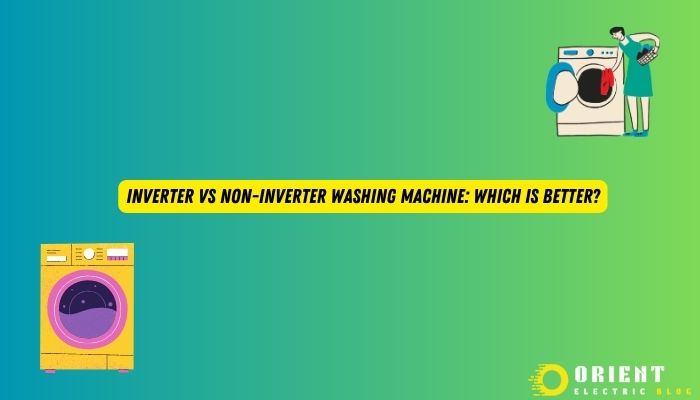Washing machines are integral to modern living since they have made laundry much more manageable. Thanks to technological developments, consumers can choose between Inverter vs Non-Inverter Washing Machine.
Both serve the same purpose but differ due to their dissimilarities in energy efficiency, performance, noise levels, durability, maintenance needs, and costs. Knowing the differences between these two types can help you make an informed decision when purchasing a washing machine.
Comparison of Inverter vs Non-Inverter Washing Machine:
Here, we’ll compare and contrast the features and benefits of an Inverter vs Non-Inverter Washing Machine. We’ll also provide some advice based on our research to help you pick an option that suits your needs and budget.
If you’re in the market for a new washer or just curious about the technology behind them, you’ll find plenty to chew on here.

Energy Efficiency:
A critical distinction between inverters and conventional washing machines is their energy efficiency. In contrast to traditional washing machines, which run constantly regardless of load size or fabric type, inverter models have variable-speed motors that adjust their rotational speed to accommodate any load.
Using only as much power as is necessary, inverter washing machines can operate at a wide range of speeds. Inverter washing machines can save up to 30% more energy than non-inverter washing machines, resulting in lower electricity costs and a smaller carbon imprint.
In addition, inverter washing machines operate at a lower volume due to the reduced vibration caused by the variable speed motor. This not only makes the machines more pleasant to operate, but it also makes them last longer by reducing the amount of wear and strain on the various parts.
On the other hand, non-inverter washing machines may waste energy and are less efficient, leading to higher utility bills. The constant-speed motor makes them more audible, which may be off-putting to specific users.
If you want a washer that is good for the environment, your wallet, and the peace of your home, consider investing in an inverter model. Remember that they may be more expensive upfront than conventional washers.
Noise and Efficiency:
When choosing a washing machine, it’s essential to consider more than energy efficiency. Inverter washing machines are designed to be more efficient and quieter than traditional washers.
By adjusting the spin speed based on the load and fabric type, inverter washing machines optimise cleaning efficiency and prolong the life of the garments they pass. As a result, your garments will be cleaner and last longer.
In addition, inverter washing machines operate at a lower volume due to the reduced vibration caused by the variable speed motor. Therefore, they are easier to use and suitable for households with young children or restless sleepers.
In contrast, non-inverter washing machines operate at a constant speed regardless of the load size or the kind of fabric being washed. This may lead to inefficient cleaning and premature fabric deterioration. Some users may additionally find the increased noise level annoying.
Therefore, an inverter model may be your best bet if you want a washer that cleans better, lasts longer, and operates quietly. The appliance’s quality and detergent might also impact its performance and noise level.
Durability and Maintenance:
The washing machine’s longevity and upkeep requirements should also be considered. Inverter washing machines are constructed to last longer with less upkeep than their non-inverter counterparts.
The inverter washing machine’s variable speed motor is designed to operate at reduced rates, hence extending the machine’s lifespan. Therefore, inverter washing machines are less likely to break down or require pricy repairs than traditional washing machines.
Inverter washers and dryers are less prone to wear out or malfunction since they have fewer moving parts. The user will have fewer maintenance issues and spend less money.
On the other hand, non-inverter washers operate at higher rates due to their fixed-speed motors, which causes component wear to occur more frequently and necessitates more frequent and costly repairs. More moving parts mean more significant wear and tear and a higher frequency of servicing needs.
Therefore, an inverter washing machine may be the most excellent alternative if you’re seeking a device that can provide superior durability, require less maintenance, and last longer. It’s important to remember that a machine’s longevity and maintenance needs might vary depending on various aspects, including the equipment’s quality, the user’s level of care and maintenance, and the frequency of use.
Cost:
The majority of buyers base their washing machine decision in part on cost. Inverter washing machines are often more expensive than conventional washers, but they can save money in the long run because of their increased longevity and low energy consumption.
Although the price of an inverter washing machine might vary from brand to brand and model to model, it is generally more expensive than a standard washing machine. However, it will save you money in the long run on your electricity bills because of its high efficiency.
In addition, inverter washing machines are built to last longer and need less upkeep, saving you money on repair and maintenance costs over time.
Conversely, non-inverter washing machines often cost less than inverter washing machines, but they may have higher lifetime costs due to lower energy efficiency and durability.
When picking between an inverter and a non-inverter washing machine, it is essential to consider the upfront cost and the total cost during the machine’s lifetime, including energy use, upkeep, and repairs.
Conclusion:
In conclusion, there are advantages and disadvantages to both washing machines with and without inverters. Inverter washing machines are more expensive to purchase initially, but they save money in the long run by being more energy efficient, lasting longer, and requiring fewer repairs.
Non-inverter washing machines may be less expensive up front, but they may perform poorly or survive as long as inverter models.
Choosing between an inverter and a non-inverter washing machine requires carefully considering your needs, preferences, and financial constraints. Considering all these factors will allow you to decide and choose the best washing machine for your needs.
